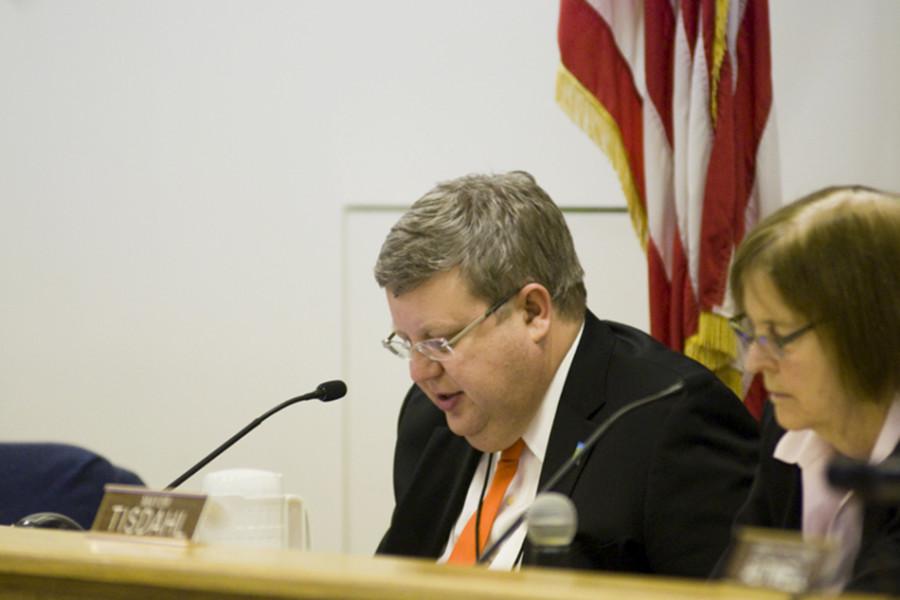Evanston staff, human services providers await cuts amid state budget stalemate
City manager Wally Bobkiewicz has decided against recommending to City Council a furlough day in September to balance upcoming state cuts. A December furlough day is still on the table.
July 11, 2015
Illinois Budget Crisis
In a typical year, July is the month when Evanston officials begin planning the next year’s budget. But this summer, city staff are at a standstill while the governor and state legislature remain at odds over a long-term budget, city manager Wally Bobkiewicz said.
In Gov. Bruce Rauner’s initial proposed budget, Evanston stood to lose $3.75 million in state funding in a major cut to the city’s Local Government Distributive Fund. Without an approved state budget more than a week into the next fiscal year, there’s no certainty as to how much Evanston will lose, Bobkiewicz said. But that state of limbo shouldn’t last for long, he said.
“When state employees start missing paychecks, then things get more serious,” Bobkiewicz said. “All of a sudden, then every state employee will be on the ground of the capitol in Springfield demanding action.”
After a state judge ruled Tuesday that state employees cannot be paid more than federal minimum wage without a budget in place, the Illinois House approved a one-month emergency budget that would authorize compensation for state employees, according to the Chicago Tribune. Rauner refused to sign the bill and instead sent it back to the Senate, the governor’s office said in an email to The Daily.
“Voting to spend money the state doesn’t have is the cause of Illinois’ financial crisis,” Rauner said in a news release. “Today, (House) Speaker Madigan and the legislators he controls irresponsibly voted for yet another unbalanced budget plan.”
Although the city is in what Bobkiewicz calls a “waiting game,” Evanston City Council took preliminary action Monday to develop potential local responses to different levels of state budget cuts. At a meeting of the Rules Committee, aldermen directed city staff to plan for both a $500,000 reduction and a $1.5 million reduction in the general fund depending on the depth of slashes to the LGDF.
“We have been quietly preparing for if there are significant reductions that we don’t start from zero,” Bobkiewicz said.
Although the city tends to try increasing the efficiency of its operations before making across-the-board cuts or laying off employees, the only current opportunities for reorganization are in the Public Works and Utilities departments, he said. After that, the city’s only other option is making cuts that curtail services, he added.
While the city would be able to survive a state funding freeze, human services providers will be harder hit because those agencies depend on a regular inflow of revenue to stay afloat, Bobkiewicz said.
“If you’re a municipality you can sit on an IOU and it’s no big deal,” he said. “If you’re a social service agency, you can’t pay your employees with IOUs.”
Andrea Densham, the executive director of Childcare Network of Evanston, said funding cuts have already begun to impact its services. At the beginning of July, the new fiscal year, CNE was forced by the state to cut eligibility for the Child Care Assistance Program, which provides low-income families with child care, Densham said. Now, new additions are only accepted into the program if they are at or below 50 percent of the federal poverty level, which means few families will qualify, she said.
“Our agency’s inability to provide that network of support for our families means it’s going to have a cascading effect on the entire community and can go all the way down to having an impact on violence and criminality,” Densham said.
Carl Caneva, the assistant director of health and human services in Evanston, said his office will serve as a resource for the organizations as they grapple with state funding cuts. While the state partially funds many Evanston social services providers, the city contributes supplementary funding through block grants and the mental health board’s budget, Caneva said.
Although funding cuts are beginning to challenge childcare providers across the state, Densham said her biggest concern is for the families who are at risk of losing services.
“It is absolutely time for the governor and the general assembly to sit together, to work this through and to come up with a solution today,” Densham said. “Every day that they don’t come up with a solution has a direct impact on the lives of children and families in our community, and it’s simply unacceptable.”
Email: [email protected]
Twitter: @juliarebeccaj


